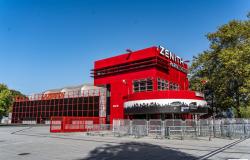A concrete block wall was erected in front of INRAE in Paris by around a hundred farmers. A symbolic gesture for them.
More than a hundred farmers erected a concrete block wall at dawn this Thursday, November 28, to symbolically block the entrance to Inrae, the National Research Institute for Agriculture, Food and Agriculture. 'environment.
In theory, “institutes like INRAE can give us the means to fulfill our function as producers”, but “this is no longer the case. For years, it is degrowth which has been organized”, launched with a speaker Pascal Verrièle, deputy secretary of the FDSEA Seine-et-Marne.
“We finance a national institute at one billion euros per year which only brings us constraints,” added Donatien Moyson, co-president of JA IDF Ouest, to AFP.
Other actions to come
Access to the front door of the building is not blocked, with a gap between the concrete block wall and the entrance to the building.
Tagged in orange on the wall about two meters high, we can read “INRA escrolos”, while a banner displays: “For sale, no longer useful – Lease to be transferred – Savings made: 1.1 billion EUR”.
No tractors, no machines: farmers, of all ages, came by car and public transport to demonstrate. Gathered very early, before 6 a.m., they were first blocked and surrounded by the police, then, calmly, laid concrete blocks in front of INRAE to erect the wall. Around 7:30 a.m., they began to disperse.
“We have restrictions on the use of certain products without effective alternative solutions, which leads to production losses,” testified Rémi Pierrard, a beet and cereal producer based near Provins (Seine-et-Marne), member of the union. Young Farmers (JA).
“We were banned from an insecticide which protected the beet at the beginning of its growth against an aphid. Now we are forced to treat with a sprayer, a treatment that is much less effective and less respectful of the auxiliary fauna, with productivity losses that can go up to up to 50% per year,” he added.
On Wednesday, 28 actions took place in 24 departments, the authorities identified, involving 1,600 people and 479 agricultural machines, in actions which targeted “more public buildings”.
The FNSEA-JA alliance had placed its first week of mobilization under the sign of opposition to the proposed free trade agreement between the EU and Mercosur countries (Brazil, Argentina, Uruguay, Paraguay). But, for its second week of coordinated actions, it is particularly targeting what it considers to be “impediments” to the work of farmers, such as prefectures, water agencies or offices of the French Biodiversity Office ( OFB).
The FNSEA and the Young Farmers are announcing new actions in the coming days and weeks.






